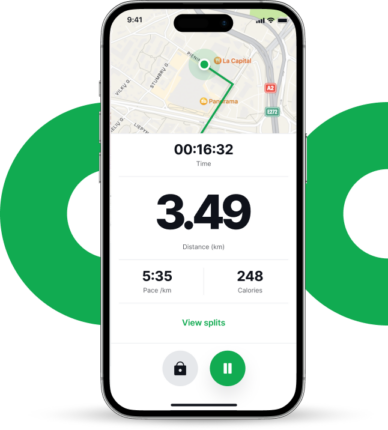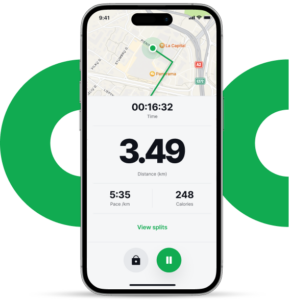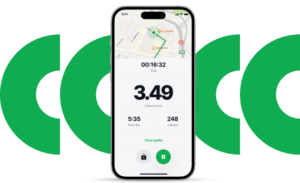Are salt tablets for runners right for you?
You’ve probably heard of salt pills for running by now. Maybe you’ve tried them already. Or maybe you’re on the fence about them.
Taking a salt supplement during or after runs has its benefits, but it may also pose risks. Read on to find out when classic salt tablets are good for runners and how they compare to electrolyte tablets.
In This Article:
What Are Salt Tablets?
Salt tablets bring you the electrolyte sodium in tablet form. They typically have a higher sodium level than sports drinks, gels, and other fuel for runners.
Sodium is an essential nutrient that keeps the nerves and muscles working properly and maintains body fluid balance.
Note that today, “salt tablets” is a term sometimes used to refer to electrolyte tablets and other similar products as well. It’s important to make the difference between salt tablets that contain only sodium and those that have other electrolytes as well.
What Do Salt Tablets Do for Runners?
Your body constantly releases sweat through its 2–4 million sweat glands that lie deep in the skin. It does this to maintain an optimal body temperature throughout the day.
When you sweat, you lose not only water but also electrolytes, and especially sodium. Long-distance running or high-intensity workouts make you sweat more.
It increases your risk of dehydration, and with it, the loss of sodium and other electrolytes. When this happens, you may experience cramps, and your running performance may suffer.
Salt tablets can help replenish lost electrolytes. However, there are different ways to replenish them during and after a run. In the past, salt tablets were essential for long-distance runners. However, now, modern runners have several options to choose from.
Should runners take salt tablets or salt capsules? The answer is not a simple yes or no. It’s important to understand when salt tablets are useful and what risks they pose.
So, what are salt tablets used for in practice? Looking at their benefits makes their use easier to understand.
Salt Tablet Benefits
Salt tablets can replenish key electrolytes, maintain their balance while you run, and help you retain fluids when you need to.
A randomized controlled trial during a half-ironman event that included long-distance running found that oral salt supplementation increases electrolyte concentrations in the blood. It also reduces the loss of water.
A 2016 study supports the use of sodium chloride hyperhydration over glycerol-based hydration options. The study found that the sodium chloride solution helped participants retain fluid during and after exercise more effectively.
Risks of Low Sodium Levels
Low sodium levels are known as hyponatremia. The condition can cause nausea, bloating, vomiting, and seizures. When it’s extreme, it may be fatal.
Drinking too much water or fluids without electrolytes may cause your sodium levels to plummet during a long run. This happens because the fluid intake dilutes the normal concentration of sodium in the bloodstream. At the same time, you also lose sodium through sweating.
Long-distance runners can be at risk of hyponatremia. This can be either because they don’t hydrate sufficiently or because they overload on fluids without electrolytes.
Tip: Make sure you’re hydrating properly by weighing yourself before and after you run. If your post-run weight is higher than 3%, you need to hydrate more. If it’s lower, you may be overhydrating. For accurate results, weigh yourself without clothes on and before you snack or eat.
Risks of Excess Sodium Levels
You’ve probably heard already that eating too much salt can be bad for your health. Too much sodium can cause high blood pressure, kidney disease, heart disease, and stroke.
Good to know: One teaspoon of table salt contains the recommended 2,300mg daily intake of sodium.
Taking too many salt tablets can lead to unhealthy levels of sodium in the blood. Known as hypernatremia, the condition can cause cell and blood vessel damage and fluid buildup in the lungs and brain. It can also cause seizures and coma and be fatal.
When to Take Electrolytes
Alongside sodium, you take other key electrolytes like chloride, calcium, potassium, magnesium, and phosphate through food. A balanced diet will normally provide sufficient electrolytes.
But as a runner, you are more likely to need additional sodium. Here are the scenarios when to take salt tablets running.
- During marathons and ultra-marathons – During very long races and workouts, you lose more sodium. You also have to hydrate more. This increases the risk of diluting healthy sodium levels with water and other fluids.
- In hot weather – Running or working out in hot weather makes your body sweat more to try to maintain a healthy temperature. Training or racing in hot weather increases your sodium requirements.
- At higher altitudes – Higher altitudes have lower air pressure. There is less oxygen in each breath, which increases dehydration and may affect performance. When running or exercising at higher altitudes, you need to hydrate more. With that, your electrolyte requirements increase.
How to Use Salt Tablets
Salt tablets for runners are not all the same. It’s important to check the ingredients to know how much sodium, chloride, and other electrolytes you’re taking in.
- Dissolve salt tablets in water and drink them before or during a run or workout.
- A classic salt tablet weighs about 1 gram and has 200–700mg of sodium. Dissolve it in about 120ml of liquid (4 ounces) or according to the instructions on the package.
- If you use sports drinks for runners, make sure to check whether they contain sodium. Adjust your salt tablet dose accordingly.
- Take salt tablets when needed rather than all the time. During a normal short run, they may not be necessary.
- Avoid overdosing on salt tablets. Taking more than recommended won’t improve your running performance.
- Store them at room temperature.
- Discuss with a nutritionist the long-term use of salt tablets, especially those with a high concentration of sodium chloride.
How Will Capsules Help Me as an Athlete?
Do salt tablets actually work for runners? Are they a necessity or only optional in some circumstances?
Runners sweat out more sodium than the average person. Runners also dilute their normal sodium levels by drinking plenty of water and other fluids. So, as a runner, you need more sodium than the average person.
Here are some reasons why you should seriously consider salt tablets:
- When you run, you lose electrolytes that you cannot replenish through drinking water alone.
- Sodium ingestion during endurance workouts or races doesn’t typically increase blood pressure like table salt when we are inactive.
- Salt tablets help stimulate thirst and fluid retention. They can help keep you properly hydrated during a demanding race.
- Being on a low-carb keto diet may lead to calcium loss that affects your bone strength. Capsules for runners that have calcium on top of sodium can help support your bone health.
- Running a long-distance race depletes more sodium and other electrolytes than normal physical activity. The same is true for running in hot weather and/or at a high altitude.
Good to know: How much sodium you need depends on your activity level. A baseline recommendation is 350–700mg of sodium per liter of fluid you’re drinking. You may need more if you’re running in hot weather and/or at a high altitude.
Salt Tablet Side Effects
Salt tablet side effects are most likely to occur if you overdose on sodium. Sodium overdose may cause unpleasant side effects that can affect your performance during a race. Side effects include:
- Extreme thirst
- Fatigue
- Confusion
- Stomach upsets
- Nausea
- Vomiting
Takeaway
In the end, here are the key things to remember about salt tablets for runners:
- Salt tablets for runners can replenish sodium, chloride, and other electrolytes that you lose while running.
- Drinking too much water when running without taking salt tablets can decrease sodium levels beyond healthy levels.
- Electrolyte tablets for runners are not the same as classic salt pills for running. They may contain more beneficial electrolytes and nutrients. Be careful to check all the ingredients.
- A salt supplement doesn’t typically increase blood pressure during endurance running, provided you stick to the recommended dose.
- You can minimize the risk of high sodium levels by choosing carefully formulated rehydration supplements for runners.
Balance is crucial when running, and that’s true of salt pills and electrolyte supplements as well. Make a healthy choice to stay safe and run at your best.
Frequently Asked Questions
Are salt tablets good for runners?
Salt tablets, also known as electrolyte supplements, can be beneficial for runners, especially those who sweat heavily during exercise. Sweating can cause significant sodium loss, which can lead to dehydration, muscle cramps, and fatigue. Salt tablets help replace lost sodium and maintain electrolyte balance, promoting hydration and performance.
When should you take salt tablets?
The timing of salt tablet intake depends on the intensity and duration of exercise, as well as individual sweat rate. For long-distance running or high-intensity workouts, it’s recommended to take salt tablets during the activity, typically every 20-30 minutes. This helps prevent the accumulation of sweat-induced electrolyte imbalances.
Why are athletes advised to take salt tablets each day?
Athletes often experience increased sweat rates due to their training intensity and physical conditioning. Regular salt tablet supplementation can help maintain electrolyte balance throughout the day, preventing potential deficits from occurring during exercise. This can enhance overall performance and reduce the risk of dehydration-related issues.
What salt is best for running?
The ideal salt supplement for runners should provide a balanced combination of sodium, potassium, and magnesium. These electrolytes help maintain fluid balance, muscle function, and overall well-being. Choose a salt supplement with a balanced ratio of sodium, potassium, and magnesium, such as Nuun Sport Electrolyte Tablets or SaltStick Caps.
References:
- McCubbin, A.J., Cox, G.R. and Broad, E.M., 2016. Case study: nutrition planning and intake for marathon des sables—a series of five runners. International journal of sport nutrition and exercise metabolism, 26(6), pp.581-587.
- Klingert, M., Nikolaidis, P.T., Weiss, K., Thuany, M., Chlíbková, D. and Knechtle, B., 2022. Exercise-associated hyponatremia in marathon runners. Journal of clinical medicine, 11(22), p.6775.
- Cederborg, J., 2006. Pass the salt?. Runner’s World, 41(11), pp.59-59.
- Young, S., Stastny, S. and Wen, Q., 2021. Comparison of Runners’ Hydration Practices during an Intended Training Run, an Intended Event, and the Hyannis Massachusetts Marathon. Journal of Exercise Physiology Online, 24(3).
- EASTWOOD, M. and EASTWOOD, M., 1988. Nutrition and diets for endurance runners. Nutrition Bulletin, 13(2), pp.93-100.














